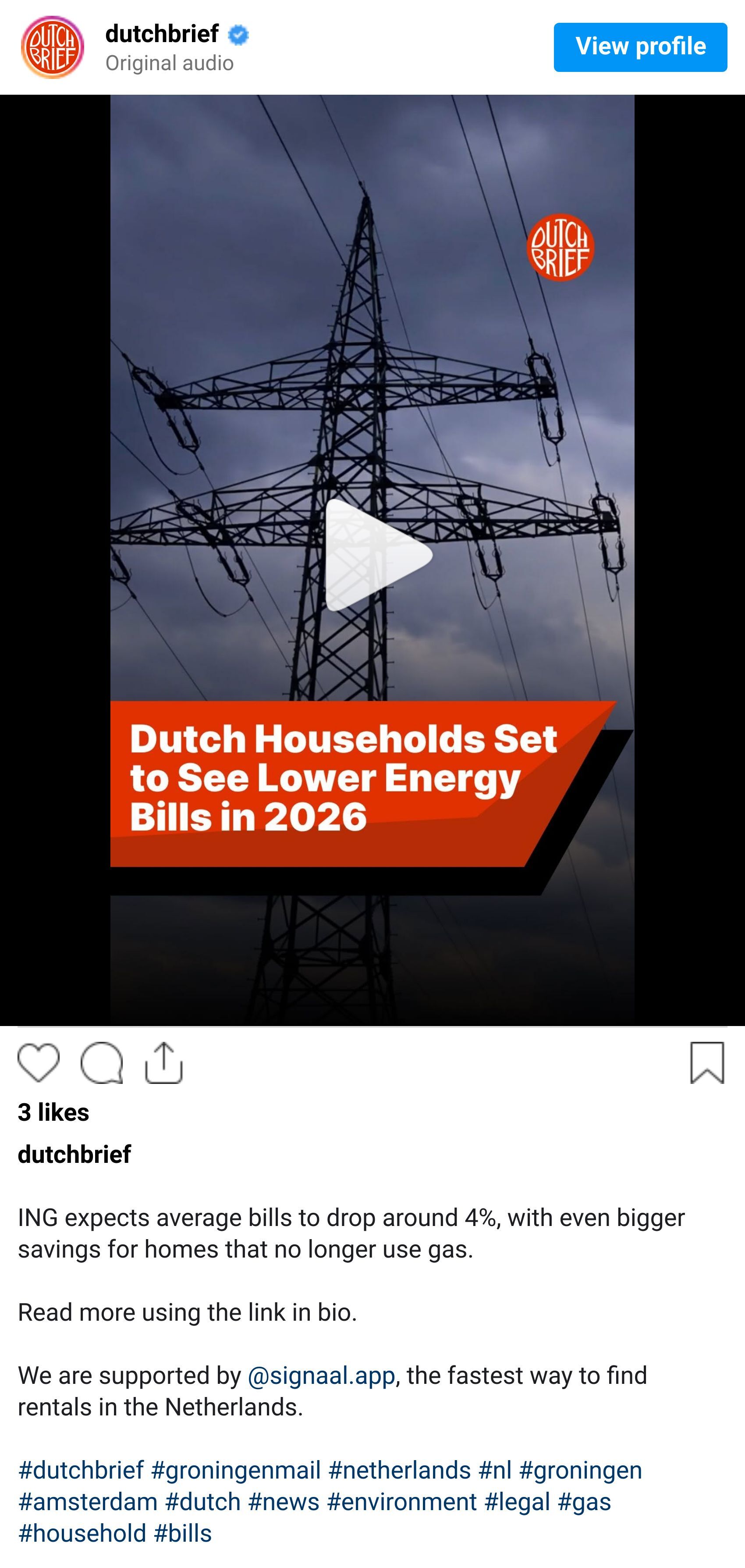Dutch households are likely to pay less for energy next year, according to new calculations from ING Research. For a household with average gas and electricity consumption, ING expects the total annual energy bill in 2026 to be approximately 4% lower than in 2025, translating to tens of euros in savings over the year.
Households that have completely eliminated gas use ,for example, by switching to heat pumps or all-electric heating systems, could see even more substantial savings, with ING estimating their energy bills may fall by as much as 9%.
Why Bills Are Expected to Fall
The main driver behind the expected decrease is a drop in variable energy supply rates: the price consumers pay per unit of gas and electricity. ING economists point to a significant increase in global liquefied natural gas (LNG) capacity as the key factor:
Major exporters including the United States and Qatar are bringing more gas onto the world market
Europe has expanded its LNG import infrastructure, including new and enlarged facilities in Germany and Finland
These developments are keeping wholesale gas prices relatively low, which then translates into lower household tariffs. The Dutch market has stabilised after sharp price increases linked to geopolitical tensions and supply disruptions in recent years, allowing suppliers to offer better rates for new and variable contracts.
However, not all components of the energy bill are decreasing. Network tariffs (the costs for using the gas and electricity grid) are set to rise. The Dutch consumer authority ACM has already warned that grid tariffs for 2026 will be higher by roughly a few percent, primarily due to necessary investments in grid infrastructure and upgrades.
Additionally, gas taxes and fixed charges are increasing, largely driven by Dutch climate policy aimed at encouraging households to move away from natural gas toward cleaner options like insulation and heat pumps. Despite these increases, ING expects the drop in supply prices to more than offset the higher taxes and network costs for most households, resulting in an overall lower bill.
Who Will Benefit Most?
The impact will vary significantly depending on individual circumstances:
Variable or new contracts: The forecast 4% reduction primarily benefits people with variable energy contracts or those signing new fixed contracts in 2026. These tariffs adjust more quickly to changing market prices, allowing households to take advantage of lower wholesale costs.
Older long-term fixed contracts: Households that locked in multi-year fixed deals in 2023 or early 2024, when prices were extremely high, will not benefit yet. They will only see lower prices once their current contracts expire and they can negotiate new terms at current market rates.
Gas-free households: Homes that have completely transitioned away from gas heating stand to save the most, potentially seeing bills drop by up to 9%. This reflects both lower electricity prices and the avoidance of rising gas-related taxes and network charges.
High energy users: ING's figures assume stable consumption patterns. If households significantly increase their gas or electricity use next year, their bills could still rise in absolute terms even if the price per unit falls.
Supporting Data and Trends
Official data from Statistics Netherlands (CBS) showed that based on January 2025 prices, the average annual energy bill was already about 2% lower than a year earlier. ING's new forecast suggests this downward trend will continue and accelerate into 2026.
Energy Affordability Improving
ING also analysed energy costs relative to household incomes. In 2025, an average Dutch household spends approximately 4.4% of its disposable income on energy. If prices move as expected, that share should decrease to roughly 4.1% in 2026.
While this remains higher than pre-energy crisis levels, it means households could have slightly more room in their budgets after several years of sharp price increases. The improved affordability signals renewed optimism for consumers following a period of uncertainty in energy pricing and represents a positive economic trend.
What This Means for You
If you live in the Netherlands, ING's analysis suggests you should:
Expect a modest decrease in your energy bill next year, especially if you're on a variable tariff or signing a new contract
Consider even greater savings if you've already reduced or eliminated gas use in your home
Be aware that rising taxes and grid fees will remain part of the bill, but for many households, lower supply prices should outweigh these increases
Compare contract terms carefully as energy prices shift—fixed-rate deals may offer stability if market conditions change
Continue energy-saving measures, as they remain financially beneficial even when prices are declining



